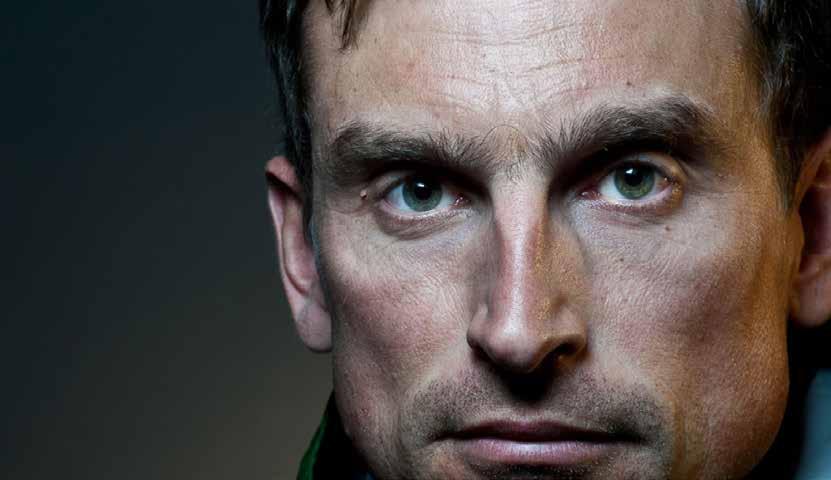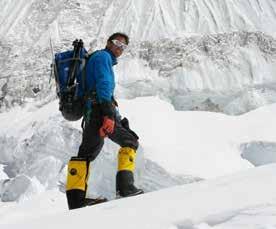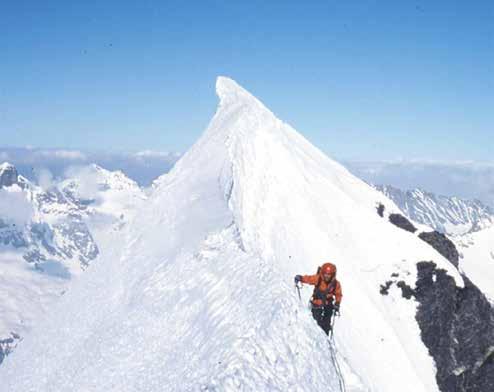
3 minute read
Kenton Cool
from Tabler Summer 2021
by RTBI
MOVING MOUNTAINS
The enviably named Kenton Cool, who has undertaken 14 ascents of Everest, discusses his experiences as a world-class mountaineer and the mindset that gets him to the top, literally.
Advertisement
Where would you have been during lockdown?
I would’ve been at Base Camp by Everest. We had a great pipeline of activity coming up, great growth, great expeditions coming up and the year looked to be off the charts... Then, it all fell off the cliff. I remember, I was in Chamonix, France, and got a message from a friend in India, saying: ‘’Bad news, India is about to go into lockdown, what does this mean for Everest?’. It felt like a black hole. I was thinking: “this cannot be happening!”. We were already £50,000 in on the project to climb Everest which may not sound like a lot, but we were all committed. At these moments, you either curl up into a ball and rock, or get to work. I asked myself, what I can do? Obviously I can’t climb mountains during a lockdown, but I asked myself what can I do online, what can I volunteer for? It’s about being able to shift focus.
How important is positivity?
I had to keep a positive mindset which isn’t always easy. I don’t always feel positive, but on Instagram I try to bring that positivity. Positivity is so important, it’s about putting a smile on your face, and before you know it others are smiling and that gives it back to you. So I get up and force myself to have a run. It lifts me up. Focus, time and money are the most important elements. Focus, we have to learn, and we struggle with it. I took actions like cutting all my news feeds off: there was so much negativity in the media. So much good stuff is happening, communities are pulling together, but just because something is ‘new’, doesn’t mean it is relevant. Something that’s new often takes away your focus, and brings negativity.
How important are expeditions to your mindset and how did you get into climbing?
Expeditions are great as a reset. There’s no connectivity, except a camera phone.

You come back energised and fresher from that disconnect. You have time to think and engage on a personal level. You have time to think, to plan, to structure. I grew up in Slough. There’s nothing commendable about Slough. I fell into mountaineering through a friend, Andy Foulks. If you want to be successful, you must be passionate about whatever it is otherwise you are wasting your time. Money is ultimately a poor driver. For most of us it’s about the community we have and our love for the cause.
I had a bad accident in Wales. I fell off rock climbing in 1996, 29 June. It’s etched in my memory. I fell about 15 feet. I was told I would forever have to walk with a stick, and have to have special shoes. But the power of the cohort, and friends, pulled me back. Climbing was everything I stood for and I grew strength from that. Climbing was all I knew and I was damned if anyone was going to take that from me.
What does living on the edge teach you?
In 2003 on Anna Purna, I thought a colleague was going to pass away overnight. We had over extended ourselves and my relationship with that person is still affected to this day. It took us to a very dark place. When you dance with the devil and stare into the abyss, it’s only then that you realise what it really means to be alive.
If one of us had been selfish and not thought of the collective, none of us would’ve come back. You need a collective of A Class players. Create the right environment and you’re capable of virtually anything. We kept the teams small and tight, and instil the message that it’s not about me or you but us. I can’t do this shit on my own, I need a great sherper team with me. The core of my team in Nepal I go with every time.
Do you have a favourite climb in the UK?
Ben A in Scotland is my favourite UK climb. It has a triple buttress on the North side, with great snow and ice and it’s never that busy. The view from the top is truly sensational.






